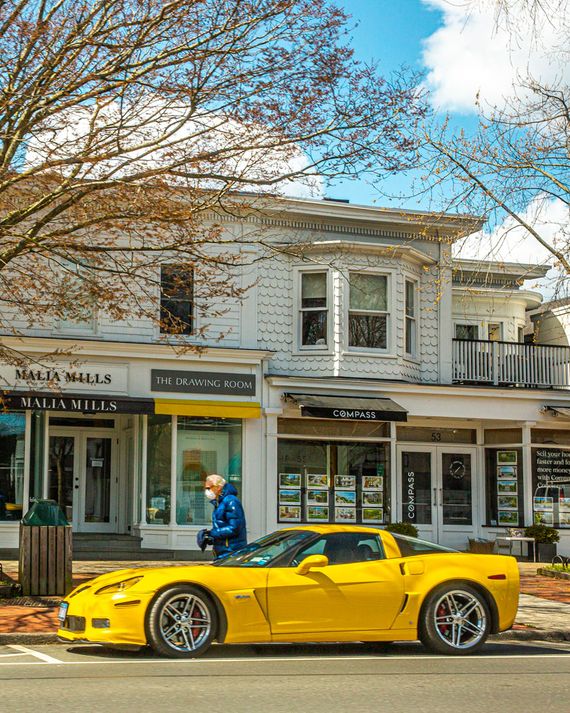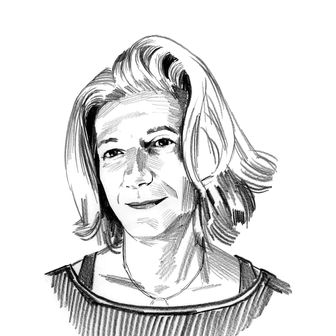
This article was featured in One Great Story, New York’s reading recommendation newsletter. Sign up here to get it nightly.
Some of my best friends own country houses. This is not a new discovery. One of the things I have loved best about my life in New York is exactly this, the wide diversity in the affluence of my friends — if you can call a group of mostly white, mostly college-educated, striving people living in Brooklyn and Manhattan “diverse.” Some of my best friends own country houses and some don’t have a pot to piss in, and before this pandemic, we all hung out together — sometimes at those country houses and sometimes at the precious restaurants we all love or at shitty bars — because even though we could observe the income discrepancies between us, we mostly pretended they did not exist. Our affinity (in taste, politics, humor, parenting concerns) superseded what we told ourselves were superficial distinctions. That was our silent agreement.
So what is this grief I feel when I encounter those same friends ensconced in the country now on Zoom? The peaceful woods, the backyard deck, the cute wallpaper, the wainscoting — all this makes my anxiety surge like a blood-sugar rush. I love my friends and understand that they are suffering too; out of town, cut off from us, their isolation is perhaps even more intense. But this fact is hard to deny: When the going got tough, they ran for the lifeboats, hoping to save themselves from whatever unknown was about to be visited upon this city-home we all share. My most ungenerous self blames them for this and for somehow betraying our pact.
What I have adored about New York from the outset — the human crush — is now the problem. Crammed together in elevators and at bars, we all breathe the same potentially infected air. That density used to mean proximity to everything and everyone, that I might walk into a party and meet an heiress or a drummer or a television anchor and that I might date an astrophysicist or a cop. The jumble, the subway, the street-corner mix — all this made me feel weirdly safe and unafraid, the exact opposite of the dark, empty streets of my childhood in Connecticut. My appetite for hyperbole and serendipitous encounters was fed by my ambition: I have an excuse to promiscuously phone and meet strangers, cultivate even more intimacy, and call it a job.
The New York of the 1990s, when my friends and I settled here, was grungy and glittering and glaringly racist in ways we weren’t looking at. (There was a lot of looking away back then in the interest of getting ahead or along, a habit that is hard to break.) Some of us chased partnerships at banks or worked nights as paralegals or went to graduate school, while others, like me, pursued our muses and mentors at book parties and nightclubs and fashion shows. At office parties, we rubbed up against the writers and editors we most admired, hoping they would admire us back. Afterward, we went downtown and did shots in bars that smelled rank, like sex. Money was always an unspoken part of this — our bosses had much more than we did; their bosses, of the proprietor class, much more than they — and these distinctions were measured not just in real estate but in handmade shoes and in car-service vouchers, and we noticed these things but none of it mattered very deeply to us. What mattered was being recognized as smart, surprising, and funny (also a little wounded and bleak) and recognizing those qualities in others, no matter how rich or poor they were. That was the ecstasy. We found each other. We were the same.
A preference for fulfillment and excitement over a fat brokerage account is easy to defend when you’re young and self-centered. In youth, no one is keeping too close an eye on the relative fragility of individual friends’ financial health; everyone knows a whopping bill hurts different dinner guests differently, but that isn’t enough to ruin the party. Even before this pandemic, I was sometimes surprised to notice that not all my friends were as determined to be heedless of the more conventional trappings of wealth as I. Occasionally, a person at work, younger or lower on the pecking order, would turn out to own some charming place in the Village, the gift of an investment-minded parent, and I would feel astonished and betrayed, as if they were cheating somehow, but also curious about how such cushiony entitlement might feel. While I was failing to delve into the fine print of my benefits package, a friend up and bought the shitty summer house we used to share; in a stroke, what was “ours” became his, and it felt like a slap. Didn’t we contribute equally to the cooking and debauchery there?
Parenthood changed my naïve aversion to noticing money; there was no way to avoid comparisons now. We finally bought our flat in Brooklyn after 18 months of the baby in the closet. (It’s big enough with beautiful light on a beautiful block; it needed work when we first moved in and needs the same work today.) But the ostentatious stratification that choked the city had begun in earnest. With children, in rich Brooklyn, there was no pretending about wealth. There were too many things to have that others could see. Nannies, architects, decorators, trainers, tutors, private school, coaches — we all partook of these amenities, some a lot and some hardly at all. There was some shame in these comparisons, also self-doubt and defensiveness, but these were undercurrents. The feeling we had about each other after a couple of glasses of wine at the preschool potluck was the same thrill of recognition as when we were young. You’re hilarious. You’re gorgeous. You know all the words to that song. Thank you for dinner, for that book, for looking after my kid, for helping me celebrate my birthday.
There is so much quarantine judgment right now, as if there were one single right way to respond to an unprecedented catastrophe or to assess and calculate real and imagined risk. A recent thread on Twitter, brimming with resentment, seemed to imply that every single person who left New York for any reason was a turncoat, including young adults who went home to their parents and the parents of young children who left when confronted with the prospect of months cooped up or trying to keep small hands off playground equipment. It is so tempting, in the face of this volume of stress, to scrutinize others for their failure to hew to some moral line. Where is your mask? You call that a mask? You consider that six feet apart? Support local businesses, but don’t leave that contaminated pizza box in the hall. Is there virtue in staying when reducing human density is the point? Or in leaving, if you might just be bringing infection with you? I remind myself that all the judgment is grief, as a cleric friend once said, and grief isn’t pretty or rational or kind.
A whole layer of New York just up and left, including some of my friends. That is shocking, as they say, but not very surprising. The rich have always holed up in the country to wait for historic unpleasantness to pass. Yes, this virus amplifies the differences between us, but the gaps have never been wider, forcing millions to the terrifying edges of the bottom tier. What’s excruciating to watch is the flagrant, hard-nosed, sometimes petty assertions of self-interest by some of the haves, the refusal of co-op boards to allow ER doctors to stay in their buildings or the lobbying for refunds by parents at certain preschools. Layoffs, price gouging, the hoarding of square footage — all this has always gone on but is now layered with the self-justification of survival (a rationale that may or may not be honest). Elizabeth Warren and Bernie Sanders were right: It is not crazy or paranoid to imagine the waters rising and being left to drown. In preserving their safety and controlling their risk, the very rich control risk and safety for everyone else.
That said, all the creatures inhabiting our apartment (three humans, a cat, and a dog) are physically healthy and relatively sane. There are places we could have gone, but so far, I am glad we stayed. It’s weird, but I still feel safer here than anywhere else, and the Brooklyn I fell in love with is Brooklyn still. My friend around the corner goes to the butcher and buys me steaks; when I bake a cake, I give him some. We see other friends on six-feet-apart walks, meeting up in Green-Wood Cemetery to visit Basquiat’s grave, and in Prospect Park we jog past a father teaching himself the banjo while his baby sleeps in the sun. But when I fail at maintaining my mental balance, what I’m left with is grief — for my city and perhaps for the loss of a dream that never was true. What I want more than anything (other than the resumption of my kid’s school) is to see my friends, all of them, to squeeze around a too-small table in a bustling restaurant in front of an obnoxious smorgasbord of overpriced share plates, eating straight off the serving dishes, shoulder to shoulder, laughing our asses off over a self-deprecating story one of us told. To go back to not caring or calculating who has more or less, who has lost or gained, and how this cataclysm will change each one of us long term. What I want is for my friends to come back from all the different places they’ve gone, for all their reasons, and to stay, so there will be restaurants we can go to again.
*This article appears in the April 27, 2020, issue of New York Magazine. Subscribe Now!





